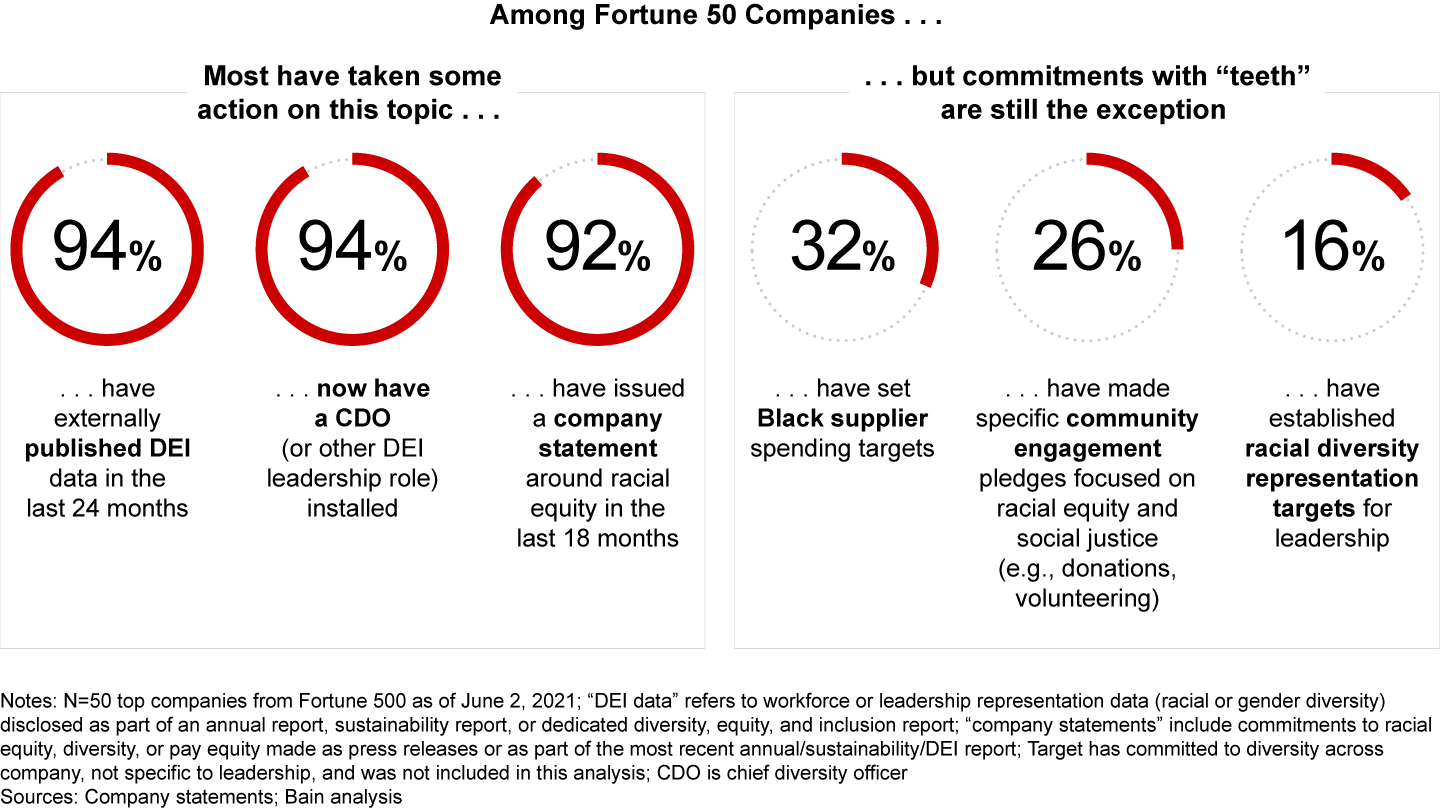Article

Black executives seeking to advance in their careers face different challenges than Black employees at lower levels of their organizations. Being at the top often means being “the only one in the room,” and cross-industry networks to support advancement of Black executives are limited. Existing programs often focus on the preprofessional and entry levels, leaving a support gap for those who are perceived to have already “arrived.”
In response to this market need, Bain launched the Black Leaders' Forum (BLF) in fall 2020. BLF has since grown into a network of nearly 200 executives across industries and yielded some key lessons about the experiences of Black business leaders who seek to advance and thrive in their careers.
The executives in BLF have found it affirming to be able to share experiences with one another, and they view these events as important learning opportunities. Members say they value having a space to discuss glass ceilings and cultural challenges that limit chances for promotion, while gaining access to a BLF network of peers across industries and functions from whom they can learn, grow, and be inspired.
Our survey of BLF members reveals an ambitious group: Ninety-five percent are excited about career progression and seek advancement to the next level of management. Yet 80% say they do not feel fully confident about getting there. The reasons for this vary, but nearly all participants note the significance of spaces in which they can share experiences and tips (such as those offered during a BLF event on corporate board readiness). These types of forums go a long way toward increasing Black executives’ capacity for charting clear and intentional career paths.
Three other key insights have emerged from our first year of BLF events:
The “Black tax” is no less real at the executive level
Navigating a pandemic. Managing the personal emotions provoked by recurring instances of racial injustice. Being asked to champion new diversity, equity, and inclusion (DEI) initiatives (especially, our discussions reveal, if you are a Black woman). Mentoring junior Black talent. And doing all this while also performing a day job. No wonder Black executives often find their work lives exhausting.
More than ever, US corporations recognize the need to invest in Black progress. Yet, most Black executives say they still do not feel they have the time, space, or peer-to-peer opportunities to work through the challenges described above. The work of educating peers and advancing equity in work environments often comes with visibility and public accolades. However, if this emotionally taxing work for Black executives is not clearly tied to compensation and advancement, they are faced with a constant trade-off: push key DEI initiatives forward or focus on their own core job function.
Black executives have the potential to create real change in their organizations, but those organizations still have a lot of work to do
True DEI progress starts with leadership. Although more than 90% of top public companies have made progress on visible DEI governance (issuing public DEI statements, for example, or hiring a chief diversity officer), relatively few companies have announced commitments with “teeth,” that is, specific goals by which they will measure their progress (see Figure 1).

Black executives, especially if they sit on boards, find themselves in a position to push for real change in their organizations. BLF members highlight opportunities to forge ahead by using their voices to enforce DEI accountability among their companies’ leaders, knowing who they can rely on as partners and active allies, and embracing their own vulnerability as a source of power. Some executives noted that now, more than ever, they feel their voice holds greater weight when it comes to making progress for Black talent through transformational ideas.
While they continue to face challenges, Black business leaders believe that DEI is advancing in the corporate world, offering them many reasons for hope
Despite the everyday reminders of racial injustice and racist systems, Black executives say they believe there has been recent progress on corporate DEI and are largely optimistic that it will continue. One positive message frequently repeated at BLF gatherings is that senior Black executives feel they can now “pound the table” for change in ways they could not before.
Several market signals also indicate that DEI momentum will continue. For example, according to Glassdoor, 76% of job seekers and employees consider a diverse workforce an important factor when assessing a company or job offer. Likewise, one in three consumers say they consider a brand’s public commitment to DEI when making a final purchase decision.
Black executives have reason to be hopeful as they keep pushing for change that will benefit their organizations, themselves, and other Black employees. Connections with other Black executives in forums such as BLF and other spaces where they can be their authentic selves further energize their efforts. Until the day arrives when Black business leaders no longer feel like “the only one in the room,” these forums and the sense of community they create will be essential for advancing the goal of diversity, equity, and inclusion in the corporate world.
The author thanks Annie Furr, Mia King, and Alanna Rodgers for their support of the Black Leaders' Forum and their contributions to the insights presented here.
